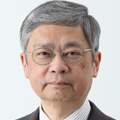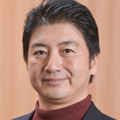Symposium B
Symp. B: Material Intelligence: Potential of in-materio computing
Symp. B: Material Intelligence: Potential of in-materio computing |
|
| Organizers: Seiya Kasai (Hokkaido Univ.) and Hirofumi Tanaka (Kyushu Institute of Technology) |
|
Prof. Wilfred G. van der Wiel, University of Twente, The Netherlands  Paper Title Materializing Cognition – Information processing in cognitive matter Short Biography Wilfred G. van der Wiel (Gouda, 1975) is full professor of Nanoelectronics and director of the BRAINS Center for Brain-Inspired Nano Systems at the University of Twente, The Netherlands. He holds a second professorship at the Institute of Physics of the Westfälische Wilhelms-Universität Münster, Germany. His research focuses on unconventional electronics for efficient information processing. Van der Wiel is a pioneer in Material Learning at the nanoscale, realizing computational functionality and artificial intelligence in designless nanomaterial substrates through principles analogous to Machine Learning. He is author of more than 125 journal articles receiving over 10,000 citations. |
|
Prof. Konrad Szaciłowski, AGH University of Science and Technology, Poland  Paper Title Towards new memristive materials and devices Short Biography Konrad Szaciłowski graduated from the Faculty of Chemistry, Jagiellonian University (Kraków, Poland) in 1995 (MSc) and 2000 (Ph.D.). After habilitation (2008) he has moved from Jagiellonian University to AGH University of Science and Technology. Now he is a group leader at the Academic Centre of Materials and Nanotechnology. His initial interest in photochemistry and spectroscopy of coordination compounds has gradually evolved towards molecular and nanoscale logic devices and finally towards unconventional computing. At the moment his main research interests encompass the design of inorganic materials for memristive applications, mimicking of neutral and synaptic processes in inanimate systems, reservoir computing and relations of musical harmony with other fields of science. He is an author of the book “Infochemistry: Information processing at nanoscale” (Wiley 2012) and numerous papers in fields of coordination chemistry, material science, spectroscopy, catalysis, and electrochemistry. In his free time he enjoys classical music, philately and single malts from Islay and Speyside. |
|
Prof. James K. Gimzewski, UCLA, USA Paper Title Short Biography | |
Prof. Takuya Matsumoto, Osaka University, Japan  Paper Title Short Biography Takuya Matsumoto is full professor of chemistry, Graduate School of Science, Osaka University, Japan. He received his PhD in physical chemistry with the electron paramagnetic resonance of supersonic oxygen beam from Osaka University in 1990. He was appointed as a research associate in 1990 and an associate professor in 1998 at SANKEN, Osaka University. His research interests include scanning probe microscopy and nanoscale devices in metal oxide and molecular materials. His recent research focus on in-material computation including stochastic resonance and neuromorphic functions for artificial intelligence. | |
Prof. Hirofumi Tanaka, Kyushu Institute of Technology, Japan  Paper Title Materials Intelligence: Recent development of in-materio reservoir devices for robot application Short Biography Professor Tanaka obtained his materials science doctorate from Osaka University in 1999, researching ferromagnetic nanoalloys、Fe16N2. He conducted further research at the RIKEN national laboratory, Pennsylvania State University, Institute of Molecular Science, and returned to Osaka University. In 2014, he became a full professor at the Department of Human Intelligence Systems, Kyushu Institute of Technology (Kyutech). His focus shifted to bio-mimicry signals, neuromorphic AI, and electric nanodevices. Concurrently, he became the director of the Research Center for Neuromorphic AI Hardware of Kyutech in 2020 to connect materials science and information technology to advance next-generation AI systems. | |
